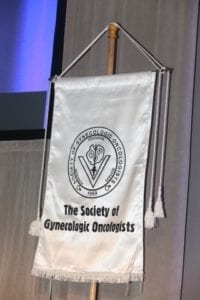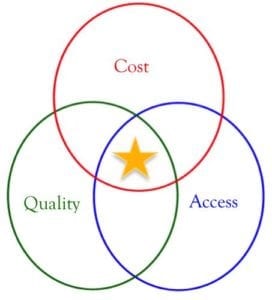Annual Meeting Coverage: Visionary Triads | Eijean Wu, MD, MPP
 The SGO coat of arms has occupied the main stage since the start of the annual meeting. Inadvertently, it lends gravity to the photos of award recipients and keynote speakers, a fitting backdrop to documents of conference highlights.
The SGO coat of arms has occupied the main stage since the start of the annual meeting. Inadvertently, it lends gravity to the photos of award recipients and keynote speakers, a fitting backdrop to documents of conference highlights.
 I never paid attention to the details on the shield, until Dr. Alvarez used the words on it to anchor his presidential address Sunday morning. Flashing up a bigger picture of the banner, I noticed for the first time the classic triad – education, research, and service. These are the cornerstones of SGO’s mission and the pillars of an academic life. They define the effective gynecologist oncologist from the perspective of our colleagues.
I never paid attention to the details on the shield, until Dr. Alvarez used the words on it to anchor his presidential address Sunday morning. Flashing up a bigger picture of the banner, I noticed for the first time the classic triad – education, research, and service. These are the cornerstones of SGO’s mission and the pillars of an academic life. They define the effective gynecologist oncologist from the perspective of our colleagues.
Yet, is this how our professional performance is evaluated in the evolving healthcare landscape? With the Affordable Care Act (ACA) taking hold, what defines a successful clinician in the eyes of patients, administrators, and policymakers, our inevitable partners in the trenches of medicine?
 I am reminded of an early mentor, Dr. Susan Eaton, a professor of public policy and a tireless advocate for women and marginalized workers. Sitting in her health care management seminar in my formative years before medical school, she delineated a different triad, a Venn diagram of cost, quality, and access. It was so simple and visionary at the same time.
I am reminded of an early mentor, Dr. Susan Eaton, a professor of public policy and a tireless advocate for women and marginalized workers. Sitting in her health care management seminar in my formative years before medical school, she delineated a different triad, a Venn diagram of cost, quality, and access. It was so simple and visionary at the same time.
As physicians, we are well-attuned to the importance of quality. We only want the best for our patients. This is where we focus our research dollars and prioritize our time.
Cost has started to creep into our consciousness by sheer necessity. As the system has become financially unsustainable, we are forced to consider the complexities of healthcare economics.
Access is the crux of the Obama administration’s ACA. Expanding insurance coverage opens the door for more people to legitimately enter the system. It allows our patients to receive standard of care.
Like all Venn diagrams, this one provides a framework for discussion and revolution, not a fixed algorithm. Like all Venn diagrams, this one has a sweet spot.
I’d like to propose that while most of us didn’t get into medicine to spend our time thinking about cost and access issues, they are now unavoidable aspects of our practice. We can wait until someone else comes up with a way to fix the problems, or we can be engaged participants, even leaders in shaping our health care system. We hold a unique perspective on how things work or don’t work when it comes to managing multifaceted diseases like cancer. Quality is meaningless if it’s unaffordable or inaccessible to those who need it most.
I look forward to Dr. Ezekiel Emanuel’s remarks and more lively debates on how we can do better, not only by our peers, but also by the patient community that we serve.